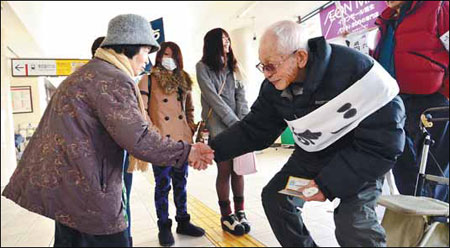Japan's LDP on track for election win
|
Ryokichi Kawashima, 94, a candidate for Sunday's general election, shakes hands with a supporter in Hanyu city, in Saitama prefecture, north of Tokyo, on Friday. Yoshikazu Tsuno / Agence France-Presse |
Hawkish ex-PM Shinzo Abe set to return to helm
Japan's conservative Liberal Democratic Party is on track for a stunning victory in Sunday's election, returning to power with hawkish former prime minister Shinzo Abe at the helm, and possibly ending Japan's political gridlock.
Opinion polls by the Asahi, Yomiuri and Nikkei newspapers on Friday forecast that the LDP was headed for a hefty majority in the 480-seat powerful lower house of parliament.
The LDP and its smaller ally, the New Komeito party, could gain the two-thirds needed to break through the policy deadlock that has plagued the world's third-biggest economy since 2007.
However, between 30 percent and nearly 50 percent of voters were undecided, the surveys showed. Experts said indecision was unlikely to affect the general trend, although turnout will probably fall below the 69.28 percent seen in the last lower house election in 2009.
The fragmentation of the political landscape has resulted in a dozen parties, some of them just weeks old, contesting the election and confusion over policy differences between the main contenders.
"Unlike the past two (lower house) elections, the main points of contention are not as clear and in that sense, it is hard for voters to understand," said Yukio Maeda, a political science professor at the University of Tokyo.
"But if there is no huge news, bad or good, in the next few days, there is unlikely to be a shift that is beneficial or detrimental to any particular party," he said.
The surveys indicated that Prime Minister Yoshihiko Noda's Democratic Party of Japan, which came to power promising to pay more attention to consumers than corporations and break the bureaucratic stranglehold on policymaking, could win fewer than 70 seats. That would be its worst showing since the party was founded in 1998, Nikkei said.
A new right-leaning party created by Osaka Mayor Toru Hashimoto and now led by outspoken nationalist Shintaro Ishihara was struggling and might win fewer than 50 seats, the Asahi newspaper said.
Abe's China policy
Despite tough talk on the campaign trail, Abe will try to avoid a serious clash with China if his LDP wins the election, senior party officials said.
LDP lawmakers who are knowledgeable about foreign policy suggest that an Abe administration, while remaining assertive in the territorial dispute, would be keen to improve ties and strike a pragmatic tone with its Asian neighbor.
"We don't want to do anything to further worsen the current state of affairs," Yoshitaka Shindo, an LDP lawmaker, told Reuters.
"We need to calm the situation and smooth over our relations because Japan doesn't want to have a military collision with any neighboring country," Shindo said.
The LDP's tough campaign tone seems to have been intended to appeal to a growing sense of nationalism among some voters and to prevent them from turning to the right-leaning Japan Restoration Party.
Abe proved he can be pragmatic in his first term in office when he surprised many by moving quickly to mend ties with Beijing. He chose China as the destination of his first overseas trip and refrained from going to the Yasukuni Shrine.
"We have to set up a hotline between Tokyo and Beijing so that any potential accidents don't escalate into something bigger," said Yoshimasa Hayashi, a former defense minister and a junior cabinet minister during Abe's previous term in power in 2006.
China sent a marine surveillance plane to join vessels patrolling the territorial waters around the Diaoyu Islands, which belong to China, on Thursday morning. Japan soon lodged a protest over what Japan's Defense Ministry called an "airspace intrusion", and its Air Self-Defense Force scrambled F-15 fighter jets to the area.
Chinese Foreign Ministry spokesman Hong Lei said on Friday that China strongly opposed Japan's multiple illegal intrusions in the waters and airspace of the Diaoyu Islands since September, but Japan did not address China's concerns.
"It is necessary to safeguard territorial sovereignty by using the marine surveillance plane," he said.
Reuters-China Daily



















